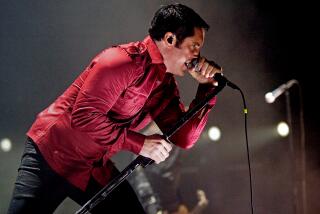POP MUSIC REVIEW : Roomful Blues Up Storm : The nine-man band from Rhode Island takes a lively joy ride at the Coach House. The horn section provides the gas.
- Share via
SAN JUAN CAPISTRANO — Roomful of Blues wouldn’t run afoul of any truth-in-advertising laws if it were to appropriate one of those old Volvo ads that trumpeted the virtues of sturdy Swedish machines that could tool around mountains, lakes and tundra for decades without a breakdown.
Roomful, however, operates on musical terrain that is thoroughly American. Friday night at the Coach House, the nine-man band from Rhode Island took a lively joy ride that included turns down just about every highway that has been etched on the blues and R&B; map over the past half century.
A five-piece horn section provided the power and precision for the ride. When the brass blared in sharp unison for the first time early in the show, it blew a palpable rush of excitement through the crowd. Steering the band was a less showy but ever-reliable drums-bass-keyboards rhythm section. An impressive new guitarist, Chris Vachon, served as the sedan’s glittery hood ornament, spinning out solos that were every bit as tasteful as they were flashy.
Roomful played some swinging, jumping, ‘40s vintage R&B;, took a bracing freight-train run through Chuck Berry’s “Let It Rock,” slowed the pace to a big, easy sashay through some New Orleans sounds, and played the straight Chicago blues both slow and torrid. A couple of bandleader Greg Piccolo’s original tunes, “What Happened to the Sugar (in My Lemonade)?” and “Red Lights,” rounded out the mix with some sweet Southern soul and Jamaican reggae, respectively.
With those interlocked horns and locked-in rhythm players, Roomful was foremost an ensemble unit. But in a show that lasted almost two hours, several individual players got ample opportunity to project a personality.
Piccolo was the first to step out, serving up a long tenor saxophone showcase that moved from a playful, easygoing opening to full-out honking. In contrast to the compact, black-bereted Piccolo and his peppery sound stood alto player Rich Lataille, who offered a cool and creamy style and a dapper look. Vachon, whose swaying, hunching moves and small, skittering dance steps recalled the performing style of Duke Robillard, the Roomful founder who now plays with the Fabulous Thunderbirds, provided perfectly cooked notes-to-order throughout the show. His big showcase was a long, Albert Collins-style jaunt through the audience that could have been tedious grandstanding, but instead turned into a varied, high-energy display.
For all its stylistic dimensions, Roomful remained fixed in its basic purpose, which was to offer friendly, good-time music. That quality makes Roomful an unbeatable dance band (which didn’t count for much in the sit-down Coach House, except with the scattering of fans who adjourned to the wings to jitterbug). However, it doesn’t make for an emotionally rounded experience. Roomful’s decor is all bright hues; you won’t get the deep, probing blues or the conversation between anguish, joy and resilience that mark the most involving blues shows. Piccolo’s voice was pliant and full of amiable personality, but it was neither large nor trenchant, so he stuck to light moods that were best suited to his vocal tools. But if the content wasn’t serious, there was nothing frivolous about the skills and acumen that Roomful brings to the blues.
Canned Heat’s 70-minute opening set offered low heat at best and canned hash at worst, which was most of the time.
Bassist Larry Taylor and drummer Fito de la Parra provide a historic link to the days when Canned Heat set the hordes a-boogying at Woodstock, but singers Al (Blind Owl) Wilson and Bob (Bear) Hite, both long dead, were the ones who gave that band its personality. Current front man James T was a competent but unremarkable player who contributed serviceable slide guitar and sang in a laid-back, mealy drawl.
Lead guitarist Harvey Mandel quickly turned into an annoyance--both in his standoffish manner and in a playing style that had all the grace and flair of a bludgeoning. Mandel wouldn’t depart from a dirty, fuzz-drenched tone, and once he started soloing, it was as if someone had turned on a faucet that couldn’t be shut off: no pauses or cadences, no shapely phrasing or dynamic shifts, just undifferentiated flow.
Listening to Mandel play the guitar was like trying to make sense of a book that has no sentences, paragraphs or punctuation, but merely an endless scrawl of verbiage. It came as a relief when Taylor switched from bass to guitar at one point and played a solo that featured clean lines and a classic blues structure.
More to Read
The biggest entertainment stories
Get our big stories about Hollywood, film, television, music, arts, culture and more right in your inbox as soon as they publish.
You may occasionally receive promotional content from the Los Angeles Times.









